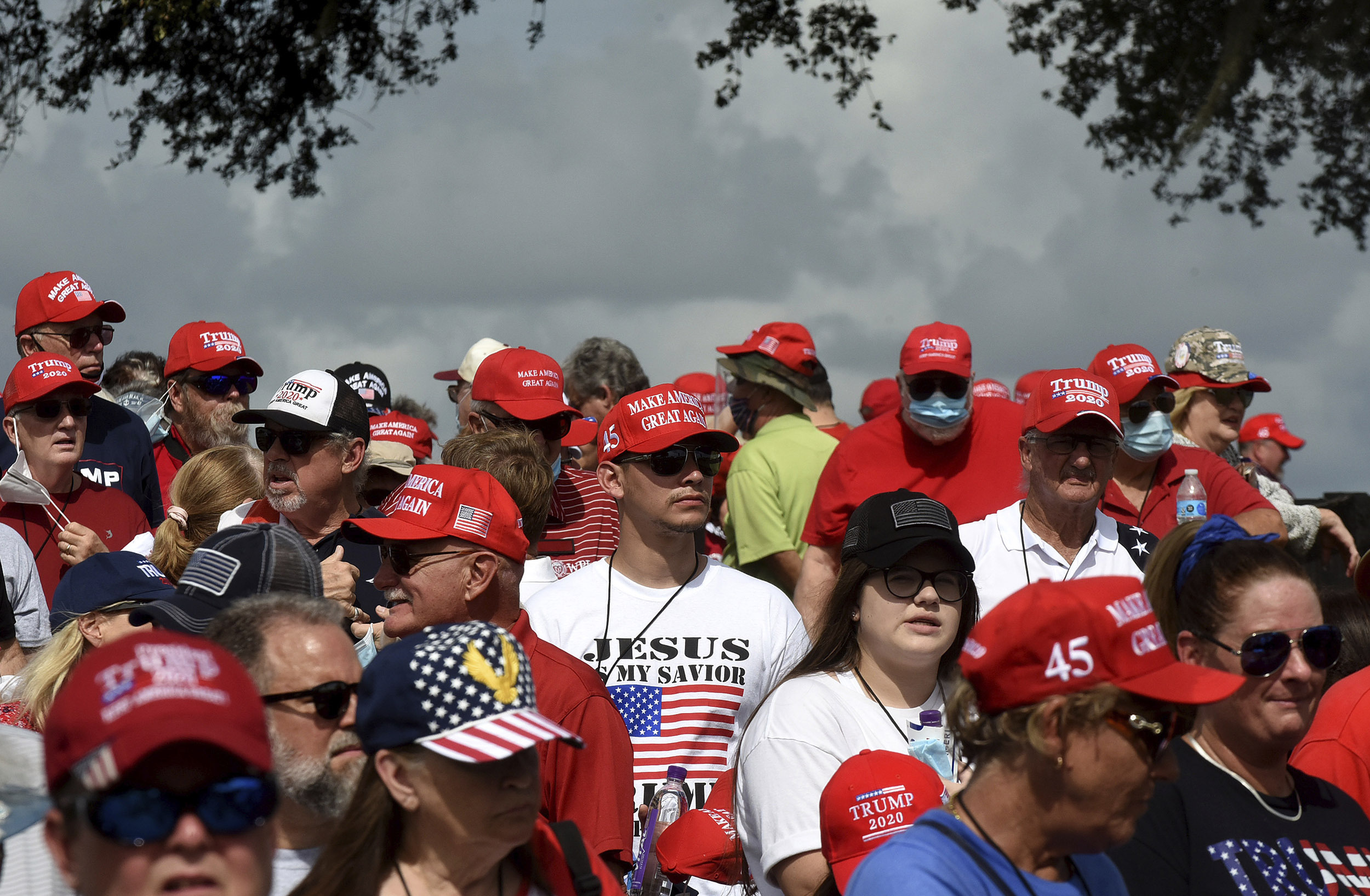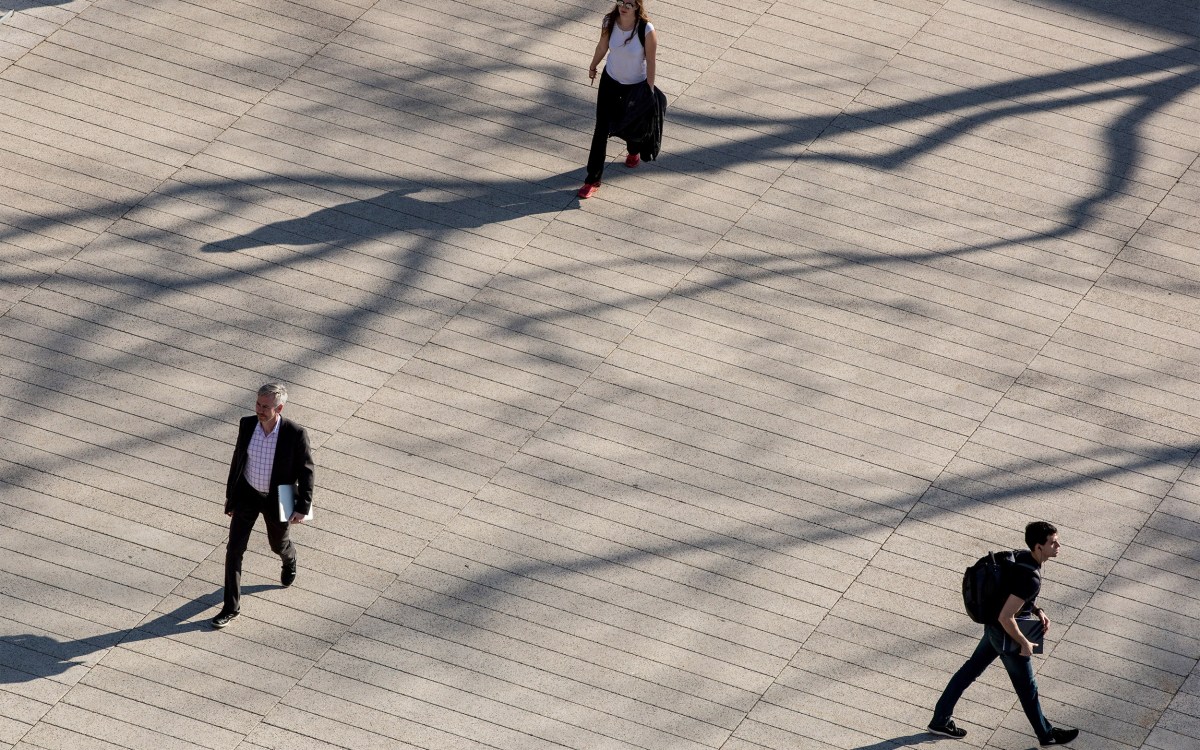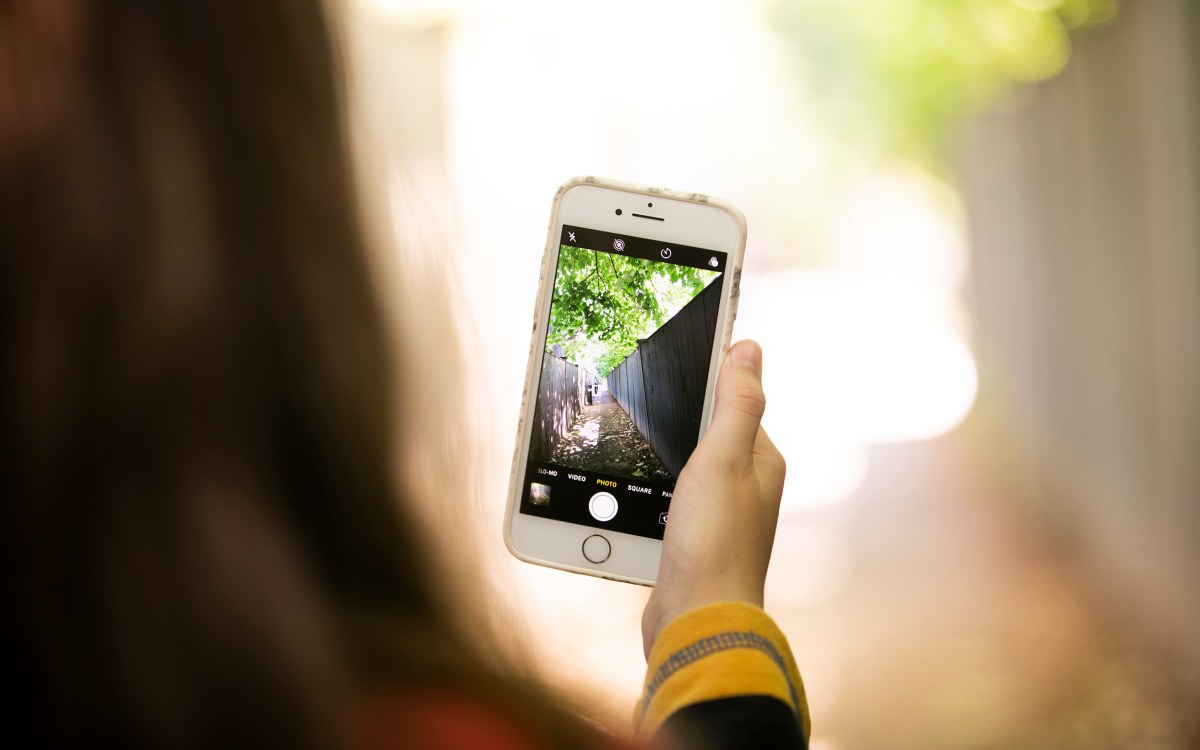
People wait in a line before President Trump holds a campaign event at The Villages Polo Field in Florida.
Paul Hennessy/Sipa via AP Images
Why isn’t the right more afraid of COVID-19?
Rejecting science and expertise, as the president urges, has become a reflection of loyalty, analysts say
Is the pandemic the most important election issue this year? That depends on whom you ask. Those who say that it is tend to favor overwhelmingly (82 percent) Joseph R. Biden, the Democratic Party nominee, yet only 24 percent of Trump supporters call it a very important factor, a sharp decline since August, according to a recent Pew Research Center poll.
Many of the president’s most enthusiastic fans believe officials have overstated the dangers and probability of contracting the airborne virus and, with a vaccine potentially imminent, they see little to be gained by keeping schools and businesses across the country closed. But people on the left simply point to hard numbers: More than 9 million stricken across the nation with over 230,000 deaths and record new infections in recent days.
The discrepancy has left many public health experts and political analysts shaking their heads. “One of the things we know from studies about how people respond to news is that nobody likes science or empiricism when it conflicts with their deeply held views. What’s happening now is that this crisis is locked into science and partisanship in a way that really strikes at the heart of the Republican Party as it’s currently constituted,” said Tom Nichols, a political scientist who teaches at Harvard Extension School and the U.S. Naval War College in Newport, R.I.
Observers of conservative politics say it’s perfectly logical that Trump fans so willingly accept his counterfactual statements about the pandemic and go along with efforts to discredit scientists in order to delegitimize politically damaging statistics. For years, Republicans have successfully seized upon a larger cultural trend of diminished faith in experts around issues like climate change.
“We think expertise is this very exclusionary idea, which it is, because it’s supposed to be: Not everybody gets a vote on how to fly the plane,” said Nichols, who wrote about the trend in a 2017 book, “The Death of Expertise.” In the pandemic, “This rejection of science and of expertise [has] become [a] demonstration of political loyalty. That’s the part I didn’t expect — that there would be an entire political movement, led by the president of the United States, to basically disavow science.”
In a recent interview, Anthony Fauci, director of the National Institute of Allergy and Infectious Diseases, said that because science still holds a place of esteem and authority in the wider culture, it has become a proxy for those who want to lash out against authority figures. It’s a view Nichols shares.
“At the end of the ’60s and ’70s, the right won the economic war. The American economy is structured just the way conservatives want. But the left won the culture war, and that just annoys the [expletive] out of conservatives,” said Nichols, a former Republican who left the party in 2018. He is now part of the Lincoln Project, an anti-Trump political action group of mostly lapsed members of the GOP.
“Think of that biker rally in [Sturgis,] South Dakota: ‘We’re all gonna show up on our Harleys, and then we’re … gonna get sick and die. But we all felt really good for a minute.’ That’s mostly a howl against the fact that the conservatives basically ceded the culture war to the American left,” he said.
Prior research into religious conservatives’ views on climate science is helpful in understanding today’s COVID and science skepticism on the right, said Theda Skocpol, Ph.D. ’75, Victor S. Thomas Professor of Government and Sociology. It isn’t that religious conservatives were unaware of science or rejected scientific findings, the studies found, “It’s that they resent the use of experts as political authorities. And I think that is exactly what we see here.”
Skocpol has studied conservative political groups and co-wrote a new book about “red state” America during the Trump administration. She says what the left and public opinion surveys often get wrong is assuming that conservatives, like the maskless crowds at Trump rallies, flout public health advisories because they’re uneducated or oblivious to the potential health risks.
“Chances are, they’re aware that the virus is dangerous,” she said.
But in such deeply partisan times, the president’s repeated denials of the pandemic’s threat, his scorn for COVID mitigation measures, and ridicule for experts like Fauci, who over the weekend again pushed for a larger role for science in managing the pandemic, get amplified by conservative media outlets, and the conspiracy theories and disinformation spread by bad actors on social media help validate anti-science skepticism.
“The president’s role in this is absolutely critical, plus the role of Fox News,” said Skocpol. “Trump’s hold over Republican voters is very strong. And some of them are simply misinformed because they’re not getting accurate information.”
Despite having received treatment, including an experimental drug at a U.S. military hospital, Trump has called federal government’s scientists “idiots” and accused doctors and hospitals of padding COVID-related death totals to “get more money.” He continues to hold political events often with thousands of people, against the wishes of many governors, telling supporters that the pandemic is “ending,” as cases rise.
One factor that has been largely overlooked and may contribute to skepticism over COVID restrictions involves the relatively minimal economic effect the pandemic has had on people working in knowledge-driven fields, like finance, tech, and academia, compared with those in retail, the service industry, and others who can’t work remotely, said Jennifer Lerner, Thornton Bradshaw Professor of Public Policy, Decision Science, and Management at Harvard Kennedy School.
“If there’s a perception that elites are giving these stay-at-home orders and elites aren’t actually that affected by them as much as working-class individuals are, then there can be perceptions of unfairness, and perceptions of unfairness are one of the single biggest drivers of anger,” she said.
With so much uncertainty around the length of the pandemic, prospects for a vaccine, and the possibility of getting sick or having it infect a loved one, Lerner said, “It’s very natural to fall into an angry state because fear is so aversive experientially. If I can be mad at somebody or mad at something, it feels like I have a little more control than if I just remain in fear or anxiety.”
Unlike recent infectious disease outbreaks, the coronavirus pandemic has prompted widespread hostility, threats, and even violence directed at government, public health officials, even store employees over requests to don face masks and adhere to social-distancing guidelines. In addition to serving as a coping mechanism, Lerner said, anger also promotes a feeling of certainty and energizes people, which drives risk-seeking behavior.
“That risk-seeking behavior and that anger will help people feel more of a sense of empowerment. It automatically will give that sense of control, when in fact a lot of control has been taken away,” she said. “It isn’t the case that acting out in anger makes us less angry. Acting out in anger actually can fuel anger. So then you get into a cycle of anger and risk-taking, anger and risk-taking.”
Amid a difficult reelection campaign, the president has ample political reasons to encourage his devotees to dismiss public health warnings and attend his rallies. That so many choose to do so, often without masks, even in the face of overwhelming evidence that it could result in illness or death, is not a demonstration of Trump’s cult-like hold on people but of cognitive dissonance, Lerner said.
“It is simply a commitment to a way of viewing the world and viewing a leader that ‘I’ve’ chosen to follow. In that sense, when I start to hear in the media that maybe Trump is not actually looking out for me and his promises about when a vaccine would be delivered aren’t coming true, and when he said the virus wasn’t a big deal and I believed that, it’s too threatening to think that I was lied to and that I, myself, believed him and talked to others about my beliefs,” she said. “And so instead, I’m going to find news sources online that will keep allowing me to say, ‘Trump is my guy and he is looking out for me.’”
Surprisingly, Nichols says, the public health and medical community, which has been leading the COVID battle, shares some blame, having inadvertently delivered some “self-inflicted wounds during this time.”
“Doctors, for example, not condemning the [large-scale] Black Lives Matter marches as potentially dangerous because they wanted to agree with the message — which we all did,” he said. “It really cut the legs out [from under] them to say, ‘I can’t believe Trump is holding these super-spreader rallies,’ when [they] thought that 50,000 people on the Washington Mall was OK.
“If you’re going to be disinterested, impartial, nonpartisan, the way you maintain that is to be that even when it hurts and when you think you’re not helping the cause of racial justice,” he said. Signing letters blasting the administration and wagging fingers on TV at maskless rallygoers only pushes those people further away.
“You’re solidifying [former Republican Sen.] Rick Santorum’s point that ‘the smart people have picked a side, and it’s not our side.’”







